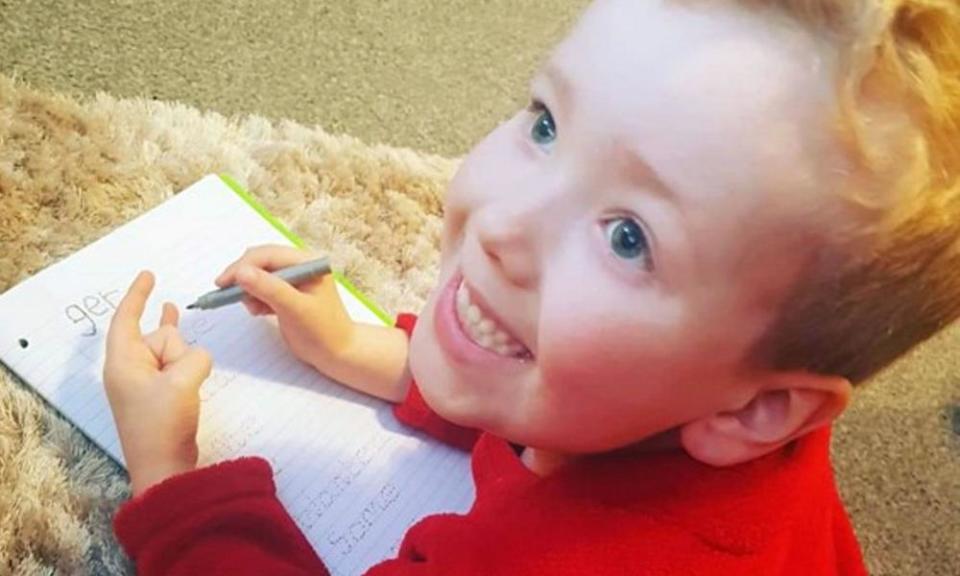Arthur Labinjo-Hughes: vulnerable children ‘slipped from view’ in pandemic

The neglect and murder of six-year-old Arthur Labinjo-Hughes was possible because vulnerable children “slipped from view” during the pandemic, the former children’s commissioner for England has said.
Anne Longfield told the BBC she was “heartbroken and totally sickened” by the case, in which Arthur was subjected to what prosecutors called a “campaign of appalling cruelty” and murdered just two months after social workers found no evidence of safeguarding concerns.
A court heard that Arthur was violently shaken and suffered an “unsurvivable brain injury” when his head was banged against a wall by his stepmother, Emma Tustin. After his death in June 2020 he was found to have 130 injuries.
Tustin was found guilty of murder and Arthur’s father, 29-year-old Thomas Hughes, was found guilty of manslaughter on Thursday. They were due to be sentenced at Coventry crown court on Friday.
Longfield, now chair of the Commission on Young Lives, said the case suggested a failure to put in place lessons from past failures such as the death of Victoria Climbié. “Very vulnerable children have continued to slip from view, and for anyone who looks at the serious case reviews, or hears about them … after a child’s death, you will see the same things coming up,” she said.
“Time and time again, missed opportunities, lack of coordination, lack of data sharing, the things that professionals need to have at hand to be able to protect these children, still aren’t in place. But whilst there is learning from the serious case reviews, it’s not enough to change what happens to protect these children.”
She said Arthur was particularly vulnerable because of the coronavirus lockdown in place in the months leading up to his death. Noting that a high caseload and inexperienced staff could also be factors, she said: “What of course was also the case here was that it was a pandemic.
“So a lot of the services went on to the screens for children, and this child in particular, Arthur, wasn’t in school. And it’s much easier for families who want to evade view to do that when they haven’t got someone in the room. So there’s a big lesson there, instantly about if there is a crisis, there are children who are going to slip from view and we have to make sure they have the protection, which does need face to face contact.”
She said the best way to keep children like Arthur safe was to intervene early when warning signs were visible to social workers. But she said that cuts to funding made that harder to do. “Long-term help is what is needed, and again that’s something that’s been there less and less over recent years, and that means that more children are falling into crisis,” she said.
Tim Loughton, the Conservative MP and former children’s minister, said he shared Longfield’s exasperation and said he felt “a sense of deja vu”. He said the focus on adult social care meant that “we’ve slightly taken our eye off the ball … we fail to acknowledge that we’ve still got some serious problems with children’s social care.”
He agreed with Longfield that the pandemic had put Arthur and other children at increased risk. He said: “There was an increase in child abuse because of course they were off the radar. Cases such as this, that might have been detected better at school, or outside, it was all going on behind closed doors.” He said he did not think any individual social worker was to blame for Arthur’s death and said “it’s the system that has failed to protect this child”.
Loughton claimed funding for children’s social care had gone up, “but the demands on children’s social care have gone up disproportionately, as well, and so too often what is happening is that we are intervening late … it may be that the social workers here just didn’t have the time to get over the [in-person intervention] threshold.”
Arthur’s paternal grandmother, Joanne Hughes, had seen bruises on Arthur’s back, with the boy telling her that Tustin “called him an ugly, horrible brat” and shoved him into the stairs.
She alerted children’s social services to the bruises in April, weeks before Arthur’s death. But two social workers who saw Arthur at Cranmore Road reported that they had “no safeguarding concerns”.
Solihull’s Local Child Safeguarding Partnership is carrying out an independent review of the circumstances surrounding the “terrible tragedy”, including the actions of Solihull council’s social services.
Outside court on Thursday, Arthur’s maternal grandmother, Madeleine Halcrow, read a tribute from his mother, Olivia Labinjo-Halcrow, which said that after the verdicts she wanted to “celebrate the beautiful little boy I knew and loved deeply”.
“The details of Arthur’s case are harrowing and incomparable – but I want people to know who Arthur was. From his huge smile and his personality to his gentle caring nature,” the statement said. “All mothers are biased and believe their children are the best, and I’m no different.”

 Yahoo Finance
Yahoo Finance 